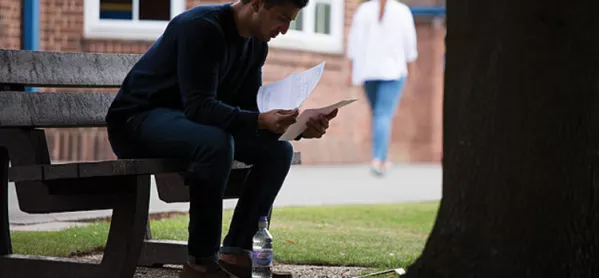A school in the north of England has seen a dramatic drop in the number of A level passes after students received an "amazing" number of unconditional offers, Tes has been told.
A school in the north of England where students received an "amazing" number of unconditional offers has seen a dramatic drop in A level passes, Tes has been told.
The results were reported by the school to Partners in Excellence (PiXL) – the largest network of schools in England and Wales.
Sir John Rowling, chair of PiXL, said the school, which he declined to name, had seen A*-E grades dive from 74 per cent in 2017 to 14 per cent this year, at a time when 40 students had received unconditional offers from universities.
He told Tes there had been "an amazing number of unconditional offers" at the school, but results had "gone hugely downwards, with some kids not even going to school after they received the unconditional offers".
One student had achieved a place on a degree course after achieving two Us and an E, he said.
Each year, PiXL monitors its members' exam results. Sir John explained that the school in question emailed in its results without comment.
PiXL initially assumed the massive swing was a "mistake" he said, and emailed the school back for clarification.
"This [head] wrote back straight away and said, 'No, there is no mistake.'"
Sir John went on: "Here’s what this person said: ‘I have students leaving here today, extremely happy. The students are not unhappy – they’ve all got places in the university. But some of them on the back of results you wouldn’t believe.'"
Sir John said PiXL was analysing the information it had received to see if unconditional offers were having a damaging impact on schools in deprived areas.
“What we’re trying to work out from what we’re picking up is where this happens," he said.
"It’s likely to happen – it seems to us from what we’ve looked so far – in socio-economically disadvantaged areas where the parental pressure to keep kids on track may be not as strong as it is in some more affluent areas.
"When that sort of support is not there, kids are opting out when they’ve had these unconditional offers."
Unconditional offers in England, Northern Ireland, and Wales have risen from 2,985 in 2013, to 67,915 in 2018 - a jump which Sir John described as "shocking".
Some commentators have raised concerns that students receiving unconditional offers can end up disengaging from their studies.
Sir John said he feared that students getting into university with unconditional offers but poor A-levels would "drop out" because "they can't hack it".
He said this, along with the collapse in grades, could damage the standing of the schools they had come from.
"[The school] will say to Ofsted, ‘All our kids got to university’ and Ofsted will say, ‘What about these results?’ The repercussions are huge,” he said.
Geoff Barton, general secretary of the Association of School and College Leaders, said he was concerned by students getting into university with very low grades.
"Our concerns about the profligate use of unconditional grades deepens when we hear stories like this," he told Tes.
"It’s hard to see why any university would think such an offer was in the interest of students, who with such grades will struggle to cope with university.
"And it makes it much more difficult for staff in schools to build strong and sustained learning habits in young people who may no longer see why they need to attend lessons regularly or strive to achieve the best grade possible."




